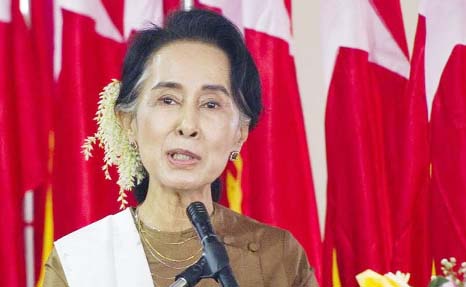
Reuters, Naypyitaw :
Myanmar election winner Aung San Suu Kyi will not press for an immediate change to the constitution that bars her from becoming president, and will instead appoint a ceremonial head of state, a senior official in her party said on Wednesday.
She will also include in the new cabinet at least one member of the military-linked Union Solidarity and Development Party (USDP), which was trounced in the November vote, as well as technocrats from ethnic minorities who have long complained of being sidelined from power.
The democracy champion is keen to avoid open confrontation with the powerful military, perhaps wary that the last time she triumphed at the ballot box in 1990, the army kept her under house arrest for years and refused to surrender power.
That does not mean Suu Kyi’s National League for Democracy (NLD) party has given up on its overarching goal of amending the constitution, the party official told Reuters, but the issue has not been discussed yet between the sides in recent weeks.
“Our choice of president will be only ceremonial and the decisions will be made only by Aung San Suu Kyi,” said the official, who declined to be named because of the sensitivity of negotiations on how the country will be run following the NLD’s landslide election victory.
He reiterated Suu Kyi’s assertion that she would stay “above the president”.
But by appointing a figurehead president, the NLD aims to “show the people this ridiculous constitution must be amended.”
Suu Kyi has discussed aspects of the transition with the army chief at “a few”, previously unreported, closed-door meetings since the elections, he said.
She has also appointed NLD liaisons who are in regular contact with the army, part of intensifying efforts to build trust between the party and its former enemies.
Last month Suu Kyi met the former head of the junta that ruled the country for 49 years, Than Shwe, pledging the NLD wanted work for the “brighter future” and not focus on the past.
The Nobel laureate’s conciliatory steps towards the army reflect a pragmatic approach to transition from semi-civilian rule in place since 2011, and see Suu Kyi’s image as a democracy icon blur with that of a political operator.
That pragmatism has drawn criticism in the recent past.
One issue Suu Kyi largely avoided during election campaigning, for example, was the plight of Myanmar’s persecuted Rohingya Muslims, a silence that was frowned upon by some international observers.
Myanmar election winner Aung San Suu Kyi will not press for an immediate change to the constitution that bars her from becoming president, and will instead appoint a ceremonial head of state, a senior official in her party said on Wednesday.
She will also include in the new cabinet at least one member of the military-linked Union Solidarity and Development Party (USDP), which was trounced in the November vote, as well as technocrats from ethnic minorities who have long complained of being sidelined from power.
The democracy champion is keen to avoid open confrontation with the powerful military, perhaps wary that the last time she triumphed at the ballot box in 1990, the army kept her under house arrest for years and refused to surrender power.
That does not mean Suu Kyi’s National League for Democracy (NLD) party has given up on its overarching goal of amending the constitution, the party official told Reuters, but the issue has not been discussed yet between the sides in recent weeks.
“Our choice of president will be only ceremonial and the decisions will be made only by Aung San Suu Kyi,” said the official, who declined to be named because of the sensitivity of negotiations on how the country will be run following the NLD’s landslide election victory.
He reiterated Suu Kyi’s assertion that she would stay “above the president”.
But by appointing a figurehead president, the NLD aims to “show the people this ridiculous constitution must be amended.”
Suu Kyi has discussed aspects of the transition with the army chief at “a few”, previously unreported, closed-door meetings since the elections, he said.
She has also appointed NLD liaisons who are in regular contact with the army, part of intensifying efforts to build trust between the party and its former enemies.
Last month Suu Kyi met the former head of the junta that ruled the country for 49 years, Than Shwe, pledging the NLD wanted work for the “brighter future” and not focus on the past.
The Nobel laureate’s conciliatory steps towards the army reflect a pragmatic approach to transition from semi-civilian rule in place since 2011, and see Suu Kyi’s image as a democracy icon blur with that of a political operator.
That pragmatism has drawn criticism in the recent past.
One issue Suu Kyi largely avoided during election campaigning, for example, was the plight of Myanmar’s persecuted Rohingya Muslims, a silence that was frowned upon by some international observers.

